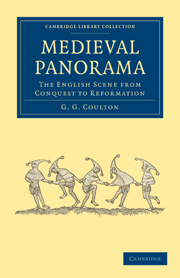Book contents
- Frontmatter
- Contents
- Illustrations
- Preface
- Introduction
- Chapter 1 The Cauldron of God's Wrath
- Chapter 2 Bishops of Rome
- Chapter 3 Conversion of the Wild Men
- Chapter 4 Feudalism emerges
- Chapter 5 Land and Folk
- Chapter 6 The Village (1)
- Chapter 7 The Village (2)
- Chapter 8 Village Dance and Song
- Chapter 9 Nature and Superstition
- Chapter 10 Popes and Prelates
- Chapter 11 Rector and Vicar
- Chapter 12 The Making of a Priest
- Chapter 13 Church statistics
- Chapter 14 The Shepherd
- Chapter 15 The Flock (1)
- Chapter 16 The Flock (2)
- Chapter 17 The Silver Lining
- Chapter 18 Dante's Commedia
- Chapter 19 The Royal Court
- Chapter 20 Chivalry
- Chapter 21 Chaucer and Malory
- Chapter 22 The Monastery
- Chapter 23 Cloister Life
- Chapter 24 The Town
- Chapter 25 Home Life
- Chapter 26 Trade and Travel
- Chapter 27 Just Price and Usury
- Chapter 28 The Ghetto (1)
- Chapter 29 The Ghetto (2)
- Chapter 30 Justice and Police
- Chapter 31 From School to University
- Chapter 32 Scholastics and Bible
- Chapter 33 Science
- Chapter 34 Medicine
- Chapter 35 Freethought and Inquisition
- Chapter 36 The Papal Schism
- Chapter 37 The Lollards
- Chapter 38 The Black Death
- Chapter 39 The Hundred Years' War
- Chapter 40 The Mystics
- Chapter 41 The Peasant Saint
- Chapter 42 Artist Life
- Chapter 43 Literary Life
- Chapter 44 Sports and Theatre
- Chapter 45 Women's Life
- Chapter 46 Marriage and Divorce
- Chapter 47 The Old and the New
- Chapter 48 More and Utopia
- Chapter 49 The Fight for the Bible
- Chapter 50 The Open Bible
- Chapter 51 Peasant and Highbrow
- Chapter 52 The Bursting of the Dykes
- Notes
- Index
- Plate section
- Frontmatter
- Contents
- Illustrations
- Preface
- Introduction
- Chapter 1 The Cauldron of God's Wrath
- Chapter 2 Bishops of Rome
- Chapter 3 Conversion of the Wild Men
- Chapter 4 Feudalism emerges
- Chapter 5 Land and Folk
- Chapter 6 The Village (1)
- Chapter 7 The Village (2)
- Chapter 8 Village Dance and Song
- Chapter 9 Nature and Superstition
- Chapter 10 Popes and Prelates
- Chapter 11 Rector and Vicar
- Chapter 12 The Making of a Priest
- Chapter 13 Church statistics
- Chapter 14 The Shepherd
- Chapter 15 The Flock (1)
- Chapter 16 The Flock (2)
- Chapter 17 The Silver Lining
- Chapter 18 Dante's Commedia
- Chapter 19 The Royal Court
- Chapter 20 Chivalry
- Chapter 21 Chaucer and Malory
- Chapter 22 The Monastery
- Chapter 23 Cloister Life
- Chapter 24 The Town
- Chapter 25 Home Life
- Chapter 26 Trade and Travel
- Chapter 27 Just Price and Usury
- Chapter 28 The Ghetto (1)
- Chapter 29 The Ghetto (2)
- Chapter 30 Justice and Police
- Chapter 31 From School to University
- Chapter 32 Scholastics and Bible
- Chapter 33 Science
- Chapter 34 Medicine
- Chapter 35 Freethought and Inquisition
- Chapter 36 The Papal Schism
- Chapter 37 The Lollards
- Chapter 38 The Black Death
- Chapter 39 The Hundred Years' War
- Chapter 40 The Mystics
- Chapter 41 The Peasant Saint
- Chapter 42 Artist Life
- Chapter 43 Literary Life
- Chapter 44 Sports and Theatre
- Chapter 45 Women's Life
- Chapter 46 Marriage and Divorce
- Chapter 47 The Old and the New
- Chapter 48 More and Utopia
- Chapter 49 The Fight for the Bible
- Chapter 50 The Open Bible
- Chapter 51 Peasant and Highbrow
- Chapter 52 The Bursting of the Dykes
- Notes
- Index
- Plate section
Summary
Throughout this chapter, I am glad to acknowledge a heavy debt to the works of Dr Charles Singer, whose volume on Religion and Science in Benn's Sixpenny Library should be read by all who are interested in this subject; they will then probably wish to pass on to his larger works.
The decay of science cannot be directly credited to the rise of Christianity; Greek and Roman science had been in full decay before Constantine's recognition of this as the favoured religion of the Empire. In those days, at any rate, Christianity came as a healthy protest against the pessimistic materialism which coloured so much of ancient thought; it objected not to actual observation and experiment (for those were no longer living forces in the Empire), but to the philosophical generalizations of paganism. For a living science two factors are essential: observation and synthesis. Observation must be patient and open-minded; synthesis must be bold and imaginative; each, sincerely used, stimulates, corrects, and supplements the other. This combination, in the Middle Ages, was nearly always imperfect. There was so little penetrating first-hand observation, in proportion to the collection and preservation of past traditions, that Dr Singer can write, without more injustice than is inherent in a single brief and epigrammatic sentence, “Medieval medicine may be summed up as a corrupted version of Galenism.” In other words, medical science stood still—or even, to some extent, went backwards, from a.d. 200 to nearly 1500.
- Type
- Chapter
- Information
- Medieval PanoramaThe English Scene from Conquest to Reformation, pp. 433 - 443Publisher: Cambridge University PressPrint publication year: 2010First published in: 1938



